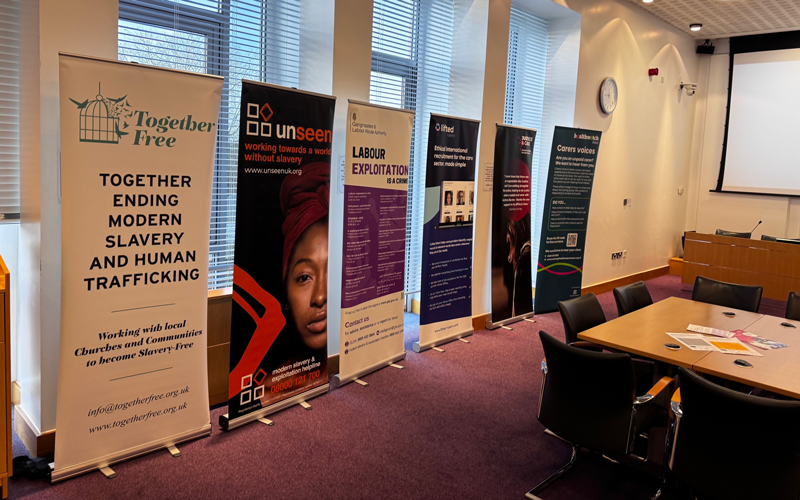Conference warns on lack of ethical recruitment of migrant care workers

Thousands of migrant care workers are being lured to the UK under false pretences, only to be left jobless, homeless and vulnerable to modern slavery.
This was the message that was heard at an international conference on Wednesday 5 February in Essex, which brought together industry leaders and government bodies to discuss both the benefits and challenges of international recruitment in social care.
Representatives from Essex Police, The Essex Care Association, UK Visas & Immigration (UKVI), the Gangmasters and Labour Abuse Authority (GLAA), Caremark Chelmsford & Uttlesford, Anglian Care and the anti-slavery charity Unseen joined forces to explore solutions that uphold ethical recruitment standards while maintaining the crucial pipeline of international talent, helping to fill vital workforce gaps.
The event was driven by the urgent need to address workforce shortages in social care. When Covid ended, many individuals who had temporarily worked in care while furloughed returned to their original industries, leaving behind a critical staffing gap. At the same time, the sector faced a mass exodus of experienced staff, resulting in a record 165,000 social care vacancies in 2022 – the highest ever recorded by Skills for Care.
In response, the government added care workers to the shortage occupation list in 2022, triggering a surge in international recruitment. While many reputable providers adhered to ethical hiring practices, others saw an opportunity to exploit vulnerable workers, luring them to the UK with false promises of employment and stability – only to abandon them on arrival, leaving them jobless, drowning in debt and, in many cases, sleeping in cars, at bus stations or on the streets. Many of these workers were left at high risk of exploitation and modern slavery.
The conference sent a clear message: international recruitment is vital to social care, but it must be done with integrity. Discussions centred on the need for better enforcement of existing regulations, stronger oversight of recruitment agencies and support mechanisms for workers facing difficulties.
Tanya George, director of the Essex Care Association and managing director of Caremark Chelmsford & Uttlesford, emphasised the importance of ethical hiring practices: “Recruiting from overseas has been invaluable for the care sector, helping to meet rising demand and deliver high-quality support to those who need it. However, we must ensure that every worker who comes to the UK is treated with dignity, has access to genuine employment opportunities, and receives the support they need to build a stable life here.”
“At Caremark Chelmsford, we have made the conscious decision to only sponsor workers already in the UK who have been abandoned by other employers and left struggling to survive. This approach ensures they have real employment, real support, and real prospects.”
Bob Fortt, prevent & protect officer, modern slavery and human trafficking, said: “The conference showcased the importance of partnership and collaboration in stressing the urgent need to protect vulnerable migrant workers from exploitation and ensure businesses follow ethical practices.
“The conference also highlighted the importance of businesses taking steps to protect their migrant workers and the consequences if they fail to do so. It also provided guidance on complying with sponsorship certificate regulations to support migrants working in the UK.”
George concluded: “In my opinion, ethical international recruitment is not just a solution – it’s a necessity. With April’s changes from the UK government – rising NI and minimum wage costs, zero-hour contract restrictions and no increase in local authority funding – the domestic social care workforce will shrink further, piling pressure on providers.
“NHS wards will become gridlocked as patients cannot be discharged due to a lack of social care support. Worse still, we could see a rise in modern-day slavery and a decline in the quality of care, and vulnerable people will go without the support they desperately need.”
• We would love to share your experiences of the difficulties recruiting in the care sector. Let us know what you think by emailing us at [email protected] or tweet us to tell us your thoughts or share this story with a friend.




